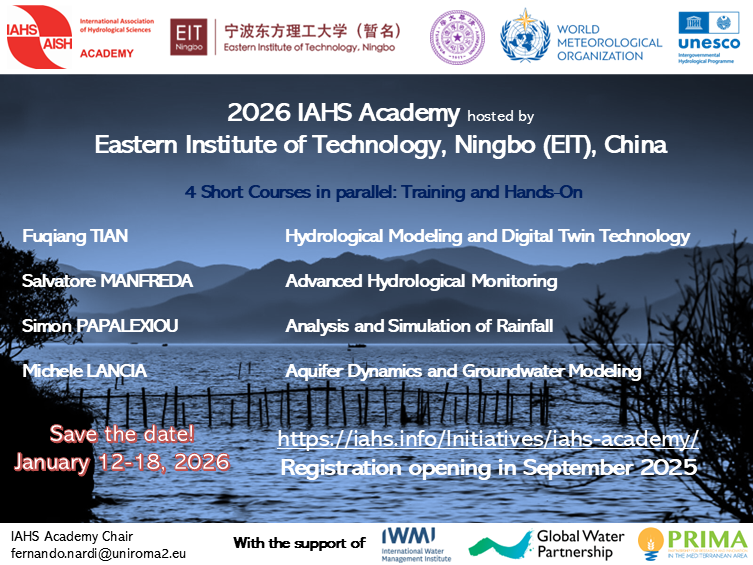IAHS News
Call for Nominations: Tison and Falkenmark Awards
Nominations are now being accepted for the IAHS Tison and Falkenmark Awards.
The IAHS Tison Award is named in honour of Léon Tison, a former Secretary-General and Honorary President of the International Association of Hydrological Sciences. The Award was established in 1982 and aims to promote excellence in research by young hydrologists. The Award will be granted for an outstanding paper published by IAHS in a period of two years previous to the deadline for nominations. More information, including the eligibility criteria and list of previous awards, is available here.

The IAHS Falkenmark Award was established in 2022 and named in honour of the late Malin Falkenmark, a professor of Applied and International Hydrology. She was best known for her long-standing work and expertise on the sustainable use of water resources to meet human and ecosystem needs. Her work is characterized by pioneering integration of both natural- and social-science approaches in global perspectives. She was particularly known for developing the Falkenmark Water Stress Indicator, concepts of Blue and Green water and Comparative hydrology. The IAHS Falkenmark Award is for best PhD thesis from a nominee who grew up in and recently performed the PhD work in one or more financially disadvantaged countries. More information, including the eligibility criteria and list of previous awards, is available here.
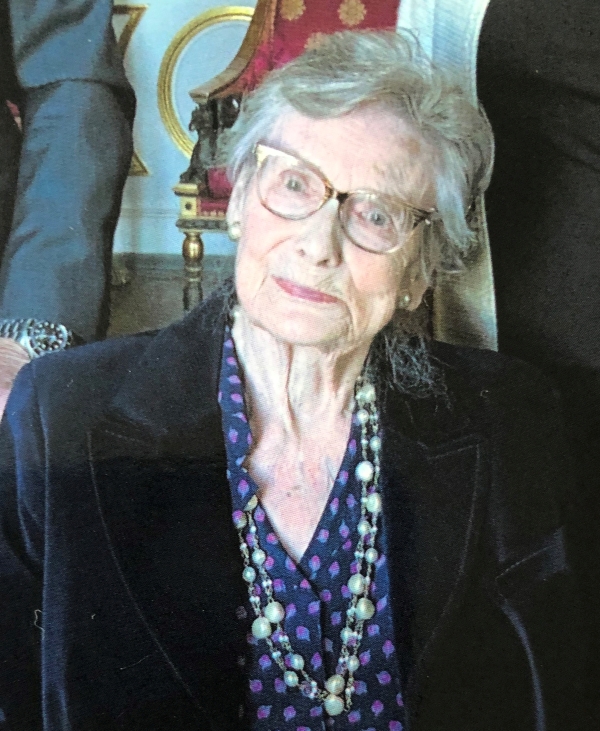
Nominations for both of the awards should be received by the Secretary General, Jean-Marie Kileshye Onema at [email protected], no later than 31 December 2025.
Save the date for the 2026 IAHS Academy
Please save the date for the IAHS Academy which will be held at the Eastern Institute of Technology in Ningbo, China from 12 - 18 January 2026. IAHS Academy application deadline is 15 October 2025. More information and the IAHS Academy application details can be found here.
The training will involve four short courses held in parallel:
- Hydrological modeling and digital twin technology
- Advanced hydrological monitoring
- Analysis and simulation of rainfall
- Aquifer dynamics and groundwater modeling
A limited number of SYSTA travel awards will be available to attend the event - application deadline of 10 October 2025. More information and the SYSTA application details can be found here.
IAHS Academy Organisers
Extended Deadline - International Conference in Astana, Kazakhstan, 17 - 21 November 2025
The International Conference "Sediment and Pollutants Transport in River Catchments: Radionuclides and Fingerprinting Techniques Applications for Assessment, Monitoring, and Risk Prevention" will be held in Astana, the capital of Kazakhstan, at the Kazakhstan Branch of Lomonosov Moscow State University from 17-21 November 2025:
- 17 November: arrival day
- 18-20 November: conference program
- 21 November: departure day.
The extended deadline for the conference has been extended to 15 September 2025. Do not forget to participate in this high level event.
The conference will be held in person and scientists working in the fields of erosion, fluvial processes, and sediment fingerprinting are warmly invited to participate. Click here to find out more about the conference, registration process, and abstracts submission. (https://sediment.ru/page69546043.html). Contact [email protected] for more information.
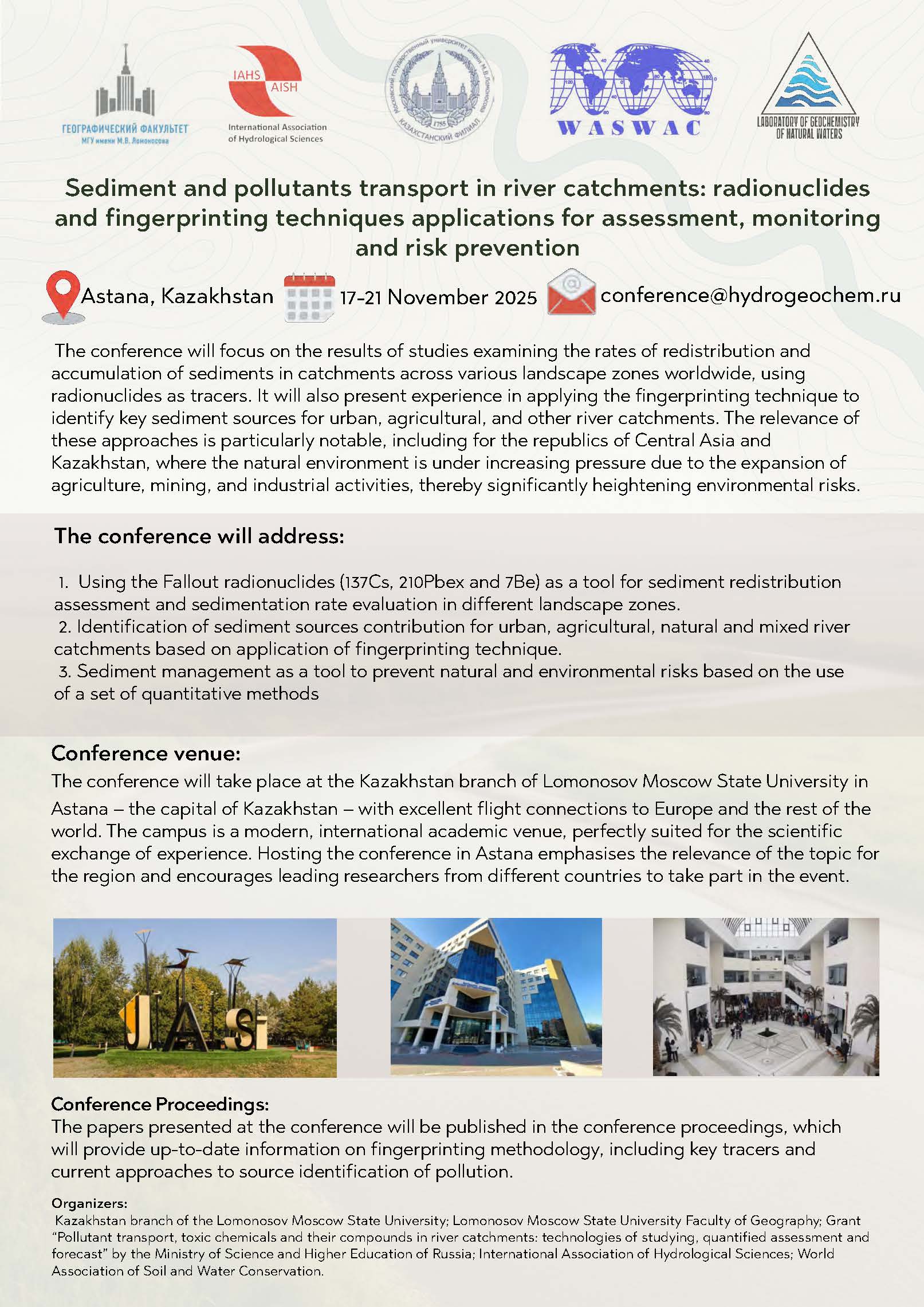
Former IAHS President Receives Stockholm Water Prize from the King of Sweden!
We are proud to celebrate the remarkable achievement of Professor Günter Blöschl, former IAHS President, who was awarded the prestigious Stockholm Water Prize by His Majesty the King of Sweden on Wednesday 27 August in recognition of his outstanding contributions to hydrological science.

Photo by Jonas Borg
Professor Blöschl's world-renowned work has significantly advanced our understanding of flood risk reduction, water resource management, flood scaling, and regional process hydrology. His ground breaking research has had a profound impact on global water management practices, earning him this well-deserved recognition.
Stockholm Water Prize: Meet the Laureate on stage with Prof Günter Blöschl, moderated by Pekka Heino is available on YouTube and can be viewed here.
The Stockholm Water Prize has been awarded annually since 1991 by the Stockholm Water Foundation in cooperation with the Royal Swedish Academy of Sciences. The award is presented by H.M. King Carl XVI Gustaf of Sweden, the official patron of the Prize, to individuals and organizations for extraordinary achievements in water-related fields.
Günter served as IAHS President from 2017 to 2021 and currently chairs the IAHS Working Group on Unsolved Problems in Hydrology (UPH). His leadership and dedication to advancing hydrological science have been invaluable to IAHS and the broader scientific community.
We extend our heartfelt congratulations to Günter for this exceptional accomplishment, which reflects not only his individual excellence but also underscores the strength and impact of the global hydrological science community.
For more information about the Stockholm Water Prize and Professor Blöschl's contributions visit "Meet the 2025 Stockholm Water Prize Laureate: Professor Günter Blöschl".
2025 IAHS Tison Awardees Announced
IAHS is pleased to announce that the 2025 Tison award goes to RuiRui Xu, Dexun Qiu and ChangXue Wu (China) for the paper: Xu, R., Qiu, D., Wu, C., Mu, X., Zhao, G., Sun, W., & Gao, P. (2023). Quantifying climate and anthropogenic impacts on runoff using the SWAT model, a Budyko-based approach and empirical methods. Hydrological Sciences Journal, 68(10), 1358–1371 https://doi.org/10.1080/02626667.2023.2218551. The paper is free to view.

The award ceremony is scheduled to take place during the upcoming IAHS Scientific Assembly in Roorkee, India from 5 - 10 October 2025.
Congratulations!
The latest news from HSJ Digest
In this issue of the HSJ Digest, learn more about video abstracts and free access to HSJ, and discover a range of Open Access articles together with the editors’ selection of highly topical research from the latest three issues of the Journal. In our regular ‘Meet the Editor’ slot, we profile the Editorial Office’s Kate Hill, who is at the heart of our interaction with editors and authors.

Thank You Prof. Berit Arheimer – Outgoing IAHS President
As we mark the end of Prof. Berit Arheimer’s distinguished presidency, we warmly thank her for her leadership and dedication to the International Association of Hydrological Sciences (IAHS) since 2021.

Berit, a Professor in Hydrological Research at the Swedish Meteorological and Hydrological Institute (SMHI), brought to IAHS a clear and inspiring vision:
1. To address major global challenges,
2. To advance the hydrological sciences, and
3. To connect people.
Under her leadership, IAHS has made meaningful strides across all three pillars:
In global engagement, Berit represented IAHS at the historic UN Water Conference in New York in 2023. She initiated the Science for Solutions Decade – HELPING – and served as its first Chair. This dynamic initiative now unites over 1200 scientists across more than 30 Working Groups worldwide, fostering collaborative solutions to today’s hydrological challenges.
In scientific outreach, Berit championed the creation of the IAHS Digital Water Globe, a new platform to showcase innovation and research across the community. She also oversaw the development and publication of the first HELPING community paper in the Hydrological Sciences Journal, exemplifying collaborative knowledge sharing. In advancing hydrological sciences, Berit laid the foundations for the IAHS Equality, Diversity and Inclusion (EDI), particularly in terms of the Falkenmark Award (one of the few hydrological awards named after a female scientist).
In community building, Berit modernised the internal IAHS management processes and communication strategies, while strengthening our organisation’s partnerships with key international bodies such as EGU, WMO, UNESCO IHP, UN Water and others. Berit’s presidency has left an enduring legacy for the IAHS community and a strong foundation for the years ahead.
On behalf of the IAHS Officers, International Commissions, Working Groups, Committees and all our members around the world—thank you, Berit, for your vision, leadership, and tireless efforts. You leave with our deepest gratitude and warmest wishes for the future!
Welcoming Prof. Salvatore Grimaldi – Incoming IAHS President
As we bid a heartfelt thank you to Prof. Berit Arheimer for her outstanding leadership over the past four years, we are pleased to officially welcome Prof. Salvatore Grimaldi as the new President of the International Association of Hydrological Sciences (IAHS). His term will run through to 2029.
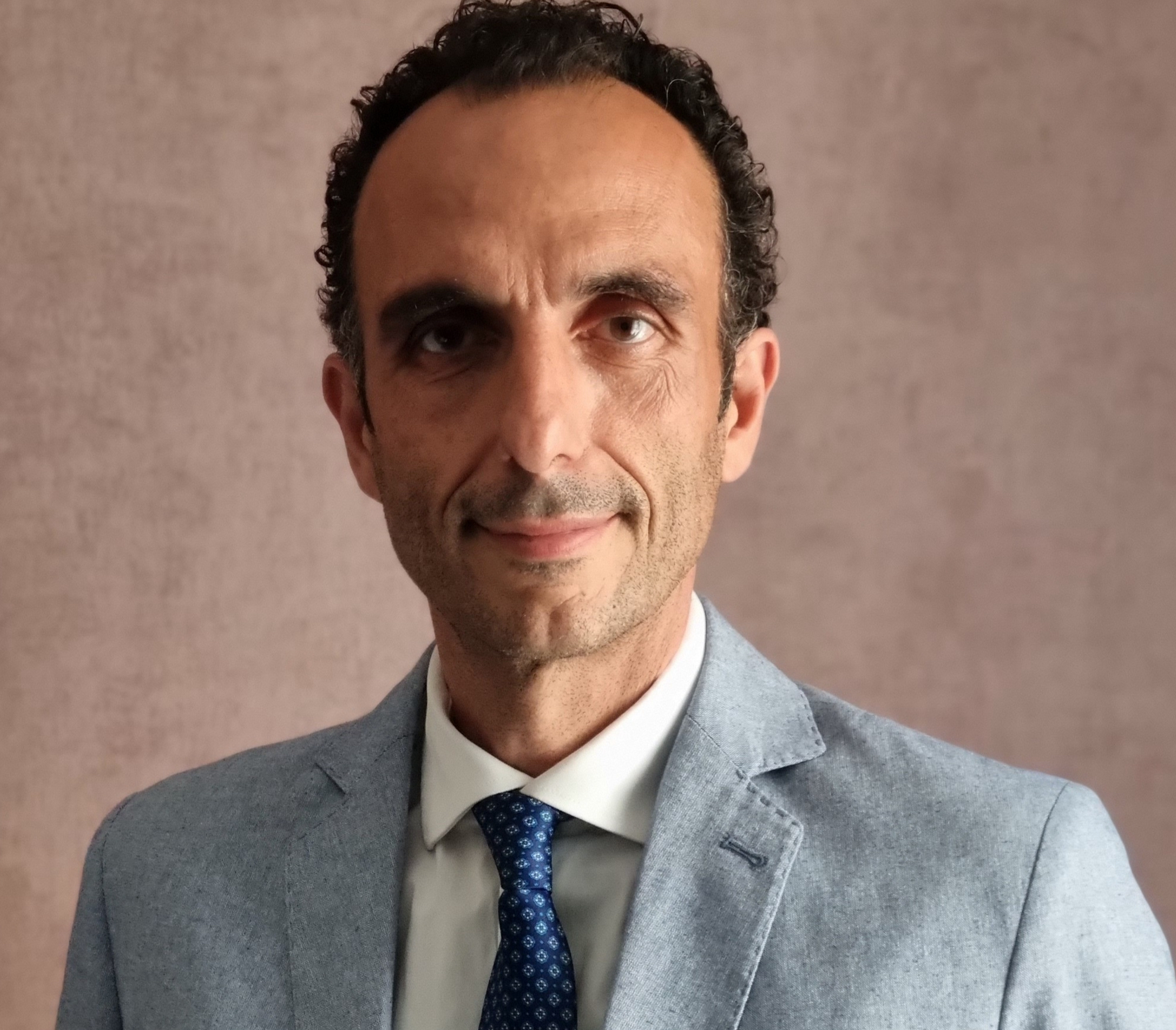
Salvatore is based at the DIBAF Department, University of Tuscia, Italy, and brings a wealth of scientific experience, institutional insight, and an enthusiastic vision for the future of IAHS. He has been involved with the Association since as early as 2003, contributing to several key initiatives and roles — including the founding of STAHY Working Group (now known as International Commission of Statistical Hydrology ICSH), MOXXI Working Group and CANDHY Working Group.
His presidency begins at a time of renewed momentum for the Association, as we continue to advance the Science for Solutions Decade – HELPING and strengthen our global impact.
In the first months of his presidency, Salvatore has outlined several key priorities:
- Supporting the Hydrological Sciences Journal (HSJ) as a central platform for the dissemination of cutting-edge hydrological research;
- Developing new collaborative initiatives with the Intergovernmental Hydrological Programme (IHP) of UNESCO and World Meteorological Organization (WMO);
- Promoting the new IAHS Scientific Assembly format, with a focus on enhancing both scientific quality and opportunities for networking;
- Preparing a series of stakeholder-oriented community papers in support of the HELPING initiative;
- Reinforcing the IAHS commitment to inclusivity and the active engagement of diverse scientific communities.
With his strong dedication to scientific excellence, international cooperation, and community building, Salvatore is ideally positioned to build on the solid foundation established by his predecessor and to guide IAHS into an exciting new chapter.
Please join us in extending a very warm welcome to Prof. Salvatore Grimaldi as he begins his tenure as IAHS President.
Invitation to the Future of Sociohydrology Webinar
We are pleased to invite you to the upcoming webinar “Future of Sociohydrology”, organised as part of the Early Career Researcher (ECR) program for the 2nd International Sociohydrology Conference, to be held in Tokyo this July.
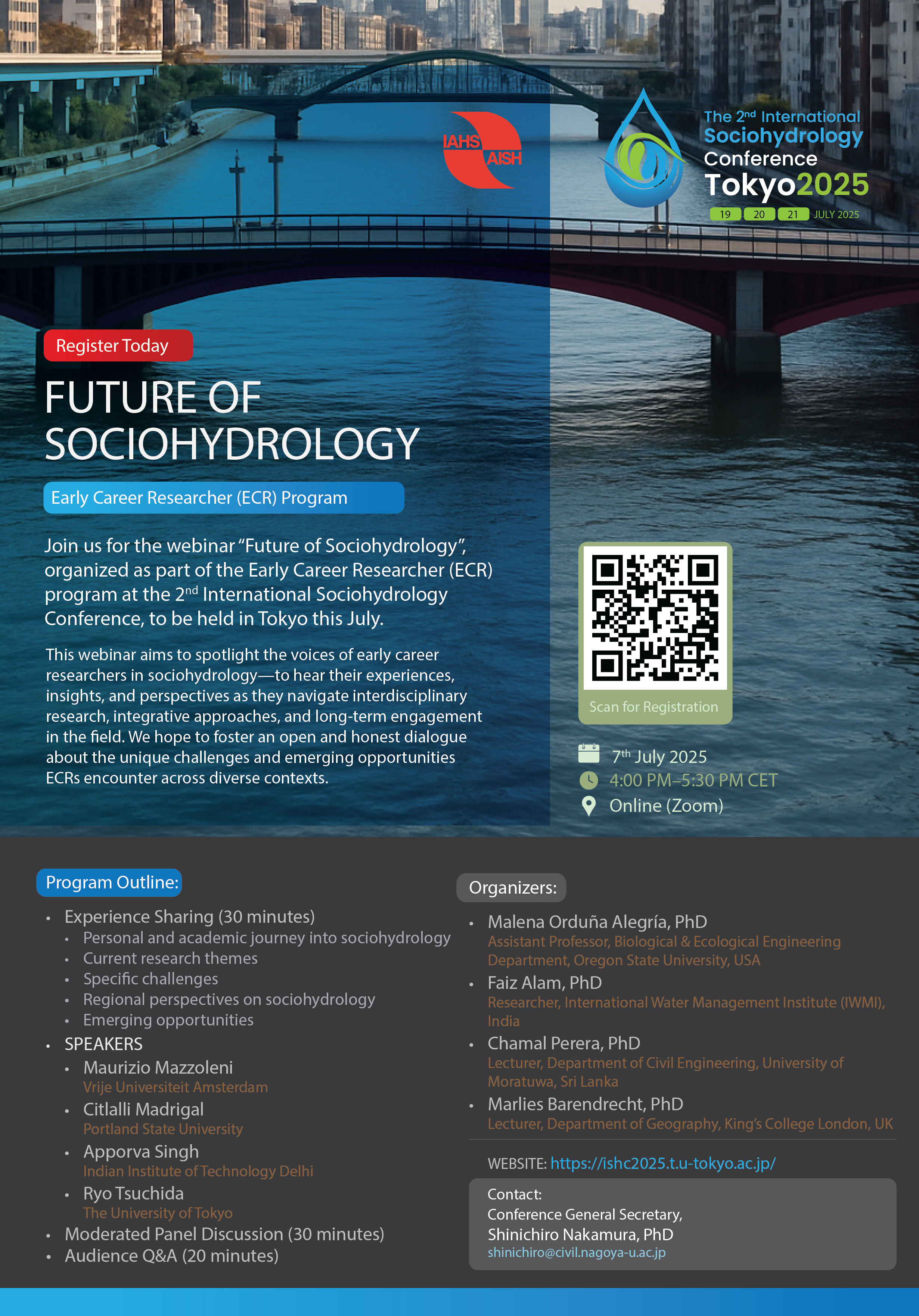
This webinar aims to spotlight the voices of early career researchers in sociohydrology—to hear their experiences, insights, and perspectives as they navigate interdisciplinary research, integrative approaches, and long-term engagement in the field. We hope to foster an open and honest dialogue about the unique challenges and emerging opportunities ECRs encounter across diverse contexts.
Event Details
Date: July 7, 2025
Time: 4:00 PM–5:30 PM CET
Format: Online (Zoom)
Registration: Click here. Once your registration is complete, you will receive an automatic email with the Zoom link for the event.
Program Outline
1.Experience Sharing (30 minutes). Each panellist will have up to 7 minutes to speak about one or more of the following:
- Their personal and academic journey into sociohydrology
- Current research or themes that inspire them
- Specific challenges they’ve faced and how they’ve addressed them
- Regional perspectives on sociohydrology
- Emerging opportunities in their context
2.Speakers:
- Maurizio Mazzoleni – Vrije Universiteit Amsterdam
- Citlalli Madrigal – Portland State University
- Ryo Tsuchida – The University of Tokyo
- Apoorva Singh (SYSTA Awardee) – Indian Institute of Technology Delhi
3.Moderated Panel Discussion (30 minutes)
4.Audience Q&A (20 minutes)
Organizers:
Malena Orduña Alegría, PhD – Assistant Professor, Biological & Ecological Engineering Department, Oregon State University
Faiz Alam, PhD – Researcher, International Water Management Institute (IWMI), India
Chamal Perera, PhD – Lecturer, Department of Civil Engineering, University of Moratuwa, Sri Lanka
Marlies Barendrecht, PhD – Lecturer, Department of Geography, King’s College London, UK.
We warmly invite you to join this thoughtful and forward-looking conversation on the future of sociohydrology!
Exploring New Horizons
IAHS and HSJ to join Bluesky for Hydrological Science Communication
![]()
The evolving landscape of social media presents IAHS with an important opportunity to reflect on how we engage with our global community. As part of our commitment to adapt our digital presence in line with IAHS values, strategic objectives, and member preferences, we are pleased to share our next step in this process.
While LinkedIn (both IAHS and HSJ) will remain our primary focus for social media engagement, we will also commence a trial of IAHS and HSJ accounts on the emerging platform Bluesky.
We have the following official Bluesky handles:
@iahs-aish.bsky.social for IAHS
@hsj-iahs.bsky.social for Hydrological Sciences Journal
We welcome feedback from the IAHS community as we explore the potential of this platform. Please email us at [email protected]
We warmly encourage IAHS members and followers who are already on Bluesky to connect with us on these accounts. If you are new to the platform, this is an excellent opportunity to explore it and stay connected with IAHS and HSJ as we continue to promote collaboration, visibility, and the advancement of hydrological science worldwide.
Thank you for your continued support in strengthening IAHS’s global visibility and collaboration.

